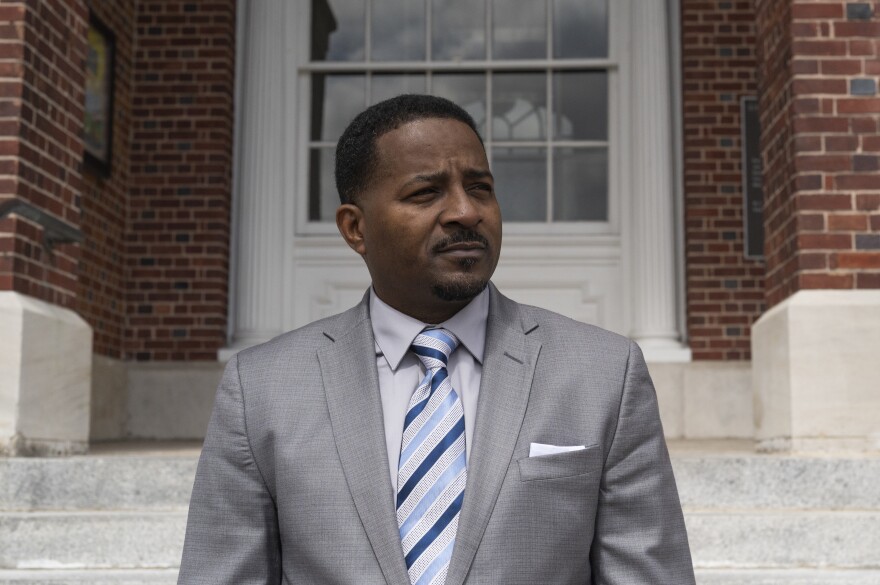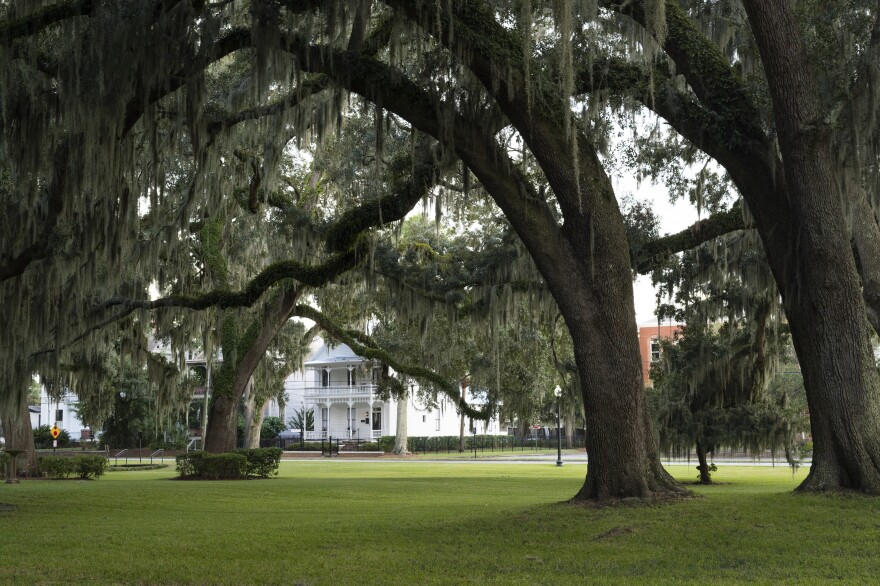One of the killings that sparked racial justice protests last year is back in the national spotlight with a trial set to begin Monday in Brunswick, Ga. Three white men are accused of murdering Ahmaud Arbery, a 25-year old Black man who was shot and killed as he was jogging down a residential street on Feb. 23, 2020, after being chased by pickup trucks.
"It was right here," says Theawanza Brooks, Arbery's aunt. "This is where he last laid to rest."
She's standing on a street corner in the Satilla Shores subdivision just outside Brunswick. It's a neighborhood tucked between waterways on the Georgia coast. Towering trees form a canopy over mostly brick ranch-style homes. A sign in one front yard declares "We Run With Ahmaud."
Arbery, a former high school athlete, lived about 2 miles from here, just across U.S. Route 17. Brooks says this was one of his regular running paths because he could stay off the highway.
"There he goes right now. Running down the street"
But some residents had grown suspicious of Arbery after repeatedly spotting him entering a new home construction site. They suspected him of recent break-ins, although police had not linked him to any.
On the day of the shooting, resident Matthew Albenze calls authorities to report that there's a guy in a house under construction. "There he goes right now," he says on the recording. "Running down the street."
The dispatcher says she'll send police but asks, "I just need to know what he was doing wrong?"
Arbery was unarmed, but defendant Travis McMichael had a shotgun.
Later, a 911 call was made by Travis' father, Gregory McMichael, also a defendant.
"There's a Black male running down the street," he says. Then he yells "Stop! Dammit stop! Travis!"
Seconds later you hear three shotgun blasts.

Theawanza Brooks says she often imagines what that moment must have been like for her nephew, trapped with no one to help him. Now she's bracing herself to hear defendants argue in court that this all happened because they suspected him in neighborhood thefts — that it was a legal citizen's arrest gone tragically awry because Arbery fought back.
"Even if you steal something, nobody has the decision to make as far as being the judge, jury and executioner," says Brooks.
Judge, jury and executioner
At trial, Travis McMichael, 35, Gregory McMichael, 65, and another neighbor, William Bryan, 52, will face state charges including murder, false imprisonment and aggravated assault. They've separately been charged with federal hate crimes. That trial is scheduled for February 2022.
Arbery's shooting has drawn intense national scrutiny, happening around the same time that racial justice protests were erupting in response to police killings.
There were serious questions about how Glynn County officials originally handled the case. Nothing happened until cellphone video of the killing, recorded by defendant Bryan, was released months later.
The former district attorney, Jackie Johnson, now faces charges that she tried to shield the McMichaels from prosecution. The elder McMichael had worked as an investigator in the DA's office and was a former police officer. His son had been in the Coast Guard. Several judges and prosecutors recused themselves from the case. Superior Court Judge Timothy Wamsley from Savannah will preside over the trial.
It took nearly three months before arrests were made, after mounting public pressure and the Georgia Bureau of Investigation taking the case from Glynn County police.
Bodycam video from the scene showed police treating Travis McMichael with great care and deference as he stood — literally with blood on his hands — while Arbery lay in the street.
"They were given a courtesy that the normal citizen would not have received," says Pastor John Perry, who was president of the local NAACP when Arbery was killed.

"Particularly in the Black community, if you were found to have killed someone," he says, "you're getting handcuffed and you're getting booked."
Perry is running for mayor of Brunswick in the aftermath of Arbery's killing. He's part of a crowded field of candidates that reflects a wider political awakening.
He says this case is a prime example of why many Black citizens see the justice system as tainted.
Relationships of privilege
"Some people call it the good old boy system. I call it relationships of privilege," says Perry. "You have people who ascend to places of power and they have established relationships, and those established relationships are looked out for in a way that other people are not looked out for."
Perry and others, including federal prosecutors, say Arbery's killing was racially motivated — that he was profiled as a Black man running through a predominantly white neighborhood.
Defense lawyers will reject that argument at trial, according to attorney Robert Rubin, who represents the gunman, Travis McMichael.
"There's a man in the neighborhood who doesn't belong in the neighborhood. Not because he's Black," Rubin says. "He doesn't belong there because he's at least trespassing in a house he doesn't belong in."
Rubin argues that that suspicion amounts to probable cause under Georgia's citizen's arrest law at the time, and that the McMichaels were simply trying to detain Arbery until police got there. But when Arbery resisted, he says, Travis McMichael acted in self-defense.
"They're literally locked together — Mr. Arbery has one hand on the gun and one hand he's punching Travis in the head," says Rubin. "And Travis knows 'if I lose possession of this gun, I'm dead.' And so he fires the gun. Mr. Arbery does not stop coming at him, and eventually he kills Mr. Arbery."
The struggle was captured on cellphone video by the third suspect — William Bryan, who goes by the name Roddie.
"Without Roddie Bryan there would be no case," says his lawyer Kevin Gough.
Bryan was in the second pickup truck chasing Arbery. Gough says his client had nothing to do with the shooting and has cooperated fully with the investigation.
"Roddie Bryant did nothing on the day in question that any patriotic American wouldn't have done," argues Gough. "He saw an individual that he didn't know running by, followed by a motor vehicle that he did, in a community that was on edge."
He says it's wrong to cast this case in light of the nation's broader struggle for equal justice.

"It feels like these folks are being pursued, punished, prosecuted, however you describe it, in a sense or a way of atoning for the sins of law enforcement real or perceived in the administration of Justice," Gough says.
Many do see this trial in the context of other prominent racial justice cases that have had a mixed bag of verdicts — Ahmaud Arbery as yet another name on a list that includes Trayvon Martin, Walter Scott, Breonna Taylor and George Floyd.
And historically the hundreds who came before, says Bobby Henderson, co-founder of A Better Glynn, a grassroots group formed last year in response to Arbery's killing.
"We witnessed a lynching"
"Here we are in the South and we witnessed a lynching," says Henderson. "How far are we from 1892? That's what's on the line."
Standing on the steps of the historic Glynn County Courthouse, Henderson says for too long, places like this did not afford justice to people like him. He sees this case as a test of whether that has changed.
"Can we sustain any of this momentum toward true equity, equality and justice?" he asks. "Or are we just stuck in a cycle of some people get it and some people don't at all? It depends. The American Constitution should not be a parchment of 'it depends.'"
For Henderson, the case is also personal. His son worked with Ahmaud Arbery at a fast food restaurant when they were teenagers.
"It took a lot from me emotionally," he says. "You're pulling together all of these components. You understand what's happening nationally, where people are seeing what is happening to Black and brown people. You're reliving Trayvon Martin once again."

His group has worked to organize people and voters and has lobbied for policy changes and investigations. And in the past year, the needle has moved. The district attorney who failed to prosecute Arbery's killing was voted out of office and is now facing charges for her handling of the case. The Georgia legislature repealed the state's citizen's arrest law and passed new hate crimes legislation. And Glynn County has a new police chief — the first Black man to lead the department. Henderson says those are steps toward a more inclusive government.
"We think that that is a direct reflection on the amount of work that we've done to get the people to realize their own power," he says. "And where they can utilize their power in order to create their own good."
Ahmaud Arbery's aunt, Theawanza Brooks, recognizes the change that has come in her nephew's name.
"A difference has been made since his death," she says. "We learned that when we come together collectively as a community, things change. And I think that this tragedy has opened up the eyes of a lot of people."
Copyright 2023 NPR. To see more, visit https://www.npr.org.



